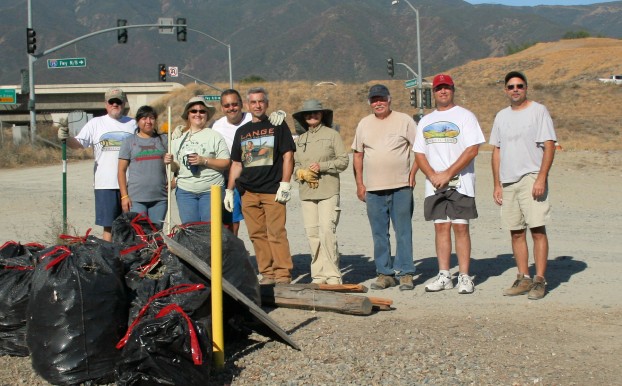
Helping out at the cleanup were, from left, John Watson, Karla Cortez, Tracy Davis, Bob Hafner, Martin Lange, Barbara Paul, Dave Davis, Ken Brooks and Rob Mucha. Not pictured are Melissa Deleo, Jannlee Watson and Adam Eventov.
Twelve people turned out early Saturday morning to assist the Beautification Committee in a mini-cleanup of the area surrounding the historic tanning vats, said to be the last visible remains of the Serrano legacy in Temescal Valley.
But first – a little history lesson.
Almost 200 years ago, a priest at the San Luis Rey Mission sent a soldier north to an area largely populated by Native Americans and grizzly bears. A first-generation Californian, Leandro Serrano was told to befriend the native tribesmen, who favored the area’s natural hot springs, and to eliminate the bears. He was given a “paper” – a permit or license to graze cattle on about five leagues of land – roughly 34 square miles.
Serrano found the area abundant with flowing water and lush vegetation that attracted bees which produced honey (that likely attracted the bears). He built an adobe in the early 1820s and called his home Temescal Rancho. That adobe was the first home built by a non-Native American in what would later become Riverside County.
Through the years, Serrano raised livestock, planted orchards and vineyards, married twice and fathered 13 children. As the family grew, Serrano built other adobes, as did his sons and sons-in-law.
Serrano died in the early 1850s and more than a decade after his death and many legal attempts to prove ownership, the U.S. Supreme Court denied the family’s claim to the land. The court ruled that Leandro had been given permission to graze cattle, not a land grant. The family was given 160 acres surrounding the current adobe in which they lived. The court decision paved the way for others to claim mining and water rights in the valley.
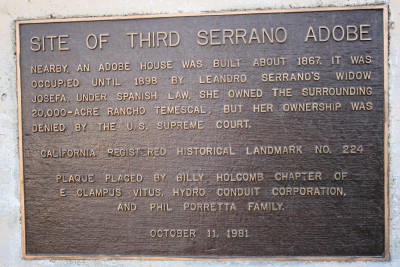
This plaque notes the third adobe built by the Serrano family in about 1867 as being “nearby.” Leandro Serrano died in the 1850s. It says Leandro’s widow Josefa’s ownership of the land was denied by the U.S. Supreme Court.
This story of the Serrano family is based on historians’ accounts of early Temescal Valley. They say Serrano’s second wife died penniless in the 1890s. The last of the Serrano family – two sisters, had to mortgage the family home to pay the burial costs, and the two left the valley in the 1898 to live in Los Angeles. Through the years, very little of the Serrano legacy has been preserved. What can be seen are the two tanning vats situated east of the I-15 and Temescal Canyon Road intersection, across the street from the Shell Station. This isn’t the original location of the vats, which were moved and reconstructed at this site years ago.
The vats and two historical markers have been neglected. Yellow cement stanchions surrounding the area keep truckers, who park there, from running over the vats. Weeds flourish; trash accumulates. A sand berm has been placed to deter the illegal dumping that occurs.
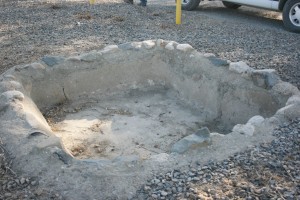
One of two Serrano tanning vats located east of the I-15 and Temescal Canyon Road intersection, across the street from the Shell Station.
Saturday’s work party cleared the weeds and used pick axes to remove roots. Trash was collected and the bags hauled away by Waste Management, which also lent tools for the cleanup. Adam Eventov, with Toscana, couldn’t work because of recent hip surgery but brought sunscreen, hand sanitizer, insect repellant and doughnuts! Wielding picks and rakes were Barbara Paul, Karla Cortez, Melissa Deleo, Tracy Davis, Rob Mucha, Martin Lange, Dave Davis, Ken Brooks, Bob Hafner, and John and Jannlee Watson.
According to Hafner, Beautification Committee chairman, the cleanup was the first phase of a project that will eventually spruce up the area with landscaping and appropriate signage. The next committee meeting is 7 p.m., Thursday, Aug. 7 at Senor Tom’s restaurant. Anyone who wants to get involved or would like notification of upcoming projects should contact Hafner: bob.hafner@verizon.net
Read a related story HERE
View more photos below.
- Work party displays bags they collected a cleanup.
- Although he couldn’t work because of hip surgery, Adam Eventov furinshed sunscreen, hand sanitizer, insect repellant and doughnuts for the work crew.
- Thank you, Karla Cortez and Rob Mucha.
- Thank you, Barbara Paul.
- Thank you, Bob Hafner, Melissa Deleo and Tracy Davis.
- Thank you, Ken Brooks
- Thank you, Dave Davis and Martin lange.
- Tracy Davis and Rob Mucha enjoy refreshments after the cleanup.

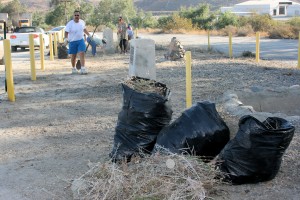
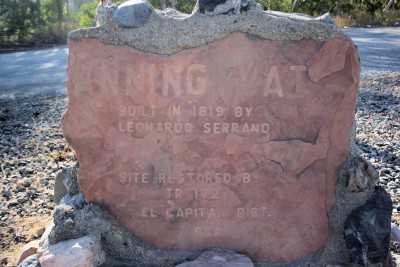
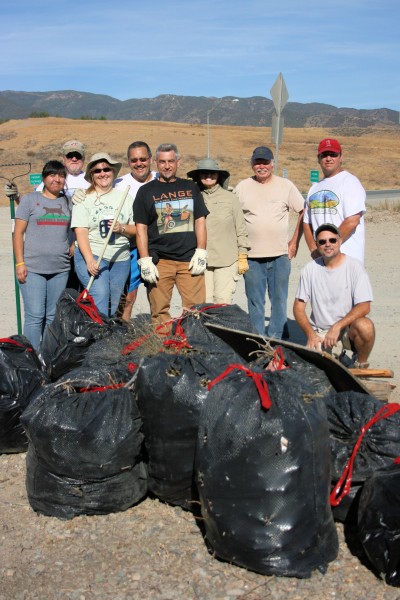
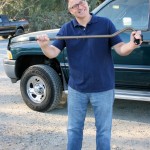
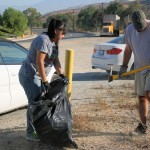
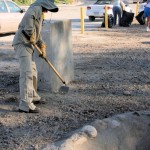
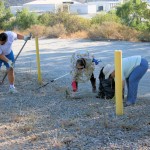
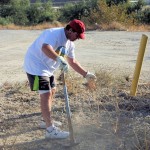
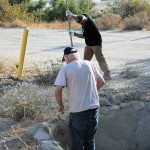

Thanks guys. sorry I could not be there due to injury. On to the next phase of the project!
This will honor our forefathers of Temescal Valley and let others know that we care about our history.
Thank you for taking time out of your busy lives to do this; thank you for caring.
Thank you for volunteering & preserving some of our local history!